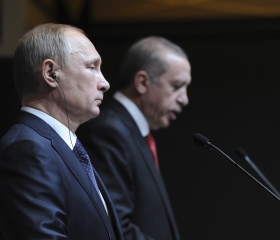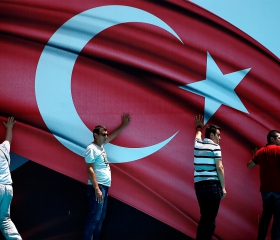In response to the terrorist attack carried out by Islamic State in the Turkish city of Gaziantep on August 20, 2016 and the shelling of the border town of Karkamış by militants, Turkey has announced the launch of Shield of the Euphrates operation, the aim of which is to destroy the militants’ bases in the Turkey–Syria border regions.
In response to the terrorist attack carried out by Islamic State in the Turkish city of Gaziantep on August 20, 2016 and the shelling of the border town of Karkamış by militants, Turkey has announced the launch of Shield of the Euphrates operation, the aim of which is to destroy the militants’ bases in the Turkey–Syria border regions.
On the first day of the operation on August 24, Turkish fighter jets and artillery liquidated more than 80 terrorist targets. Backed by Turkish troops, the Free Syrian Army carried out an offensive of its own, taking control of several villages and, later, Jarabulus.
The objectives of the operation include ensuring security in the border regions, carrying out strikes against the militants and providing humanitarian assistance to prevent another wave of refugees from spilling over the borders. In addition, Minister of the Interior Efkan Ala has identified maintaining the territorial integrity of Syria and assisting the anti-terrorist coalition headed by the United States. At a press conference held in Ankara, Recep Tayyip Erdoğan announced the launch of military operations against the People’s Protection Units. The People’s Protection Units is a group made up primarily of Kurdish militants and is seen by Turkey as a part of the Kurdistan Workers’ Party (designated a terrorist organization by Turkey).
Vice President of the United States Joseph Biden arrived in Turkey on a planned visit only a few hours after the military operation began. The talks were to centre on the extradition of Muhammed Fethullah Gülen, who has been living as a refugee in the United States since 1999 and who the Turkish authorities believe was behind the attempted military coup in the summer of 2016. However, since the visit took place on the same day that the military operation was launched, the attention was focused on Turkey’s intervention in Syria.
The position of the United States with regard to the Turkish incursion is important because the Kurdish militia was seen in Syria as a force supporting the coalition and leading the fight against Islamic State. Having refused to intervene directly in Syria, the countries that make up coalition focused for the most part on aerial bombardments, or on supplying weapons to and training the Syrian Kurds. It was on account of the Kurdish part of the Syrian Democratic Forces, a military association formed in October 2015 by followers of the Kurdistan Workers’ Party, that Turkey opposed cooperation with them, fighting off their advances with aerial strikes of their own. Despite this, the Kurdish forces were able to capture the city of Manbij and move further, which was seen as a threat by Turkey. The true objective, therefore, as the expert security analyst Metin Gurcan suggests, was not the fight against Islamic state; rather it was to create a humanitarian zone between Jarablus and Marea to reduce the flow of refugees and prevent the influence of the Kurdish militia, which has started to move towards the Turkish borders, from spreading.
Minister of Foreign Affairs Turkey Mevlüt Çavuşoğlu and Deputy Prime Minister Numan Kurtulmuş believe that by liberating the border regions and moving to areas populated by Kurds, the Kurdish authorities are planning to establish a self-governing autonomous region there. They could then take advantage of the instability of the Turkish border provinces to try and turn the region into an independent Kurdish state. This is why the Turkish authorities are attempting through the armed forces to push the militants back to the eastern bank of the Euphrates.
It is important to note that the operation was organized two years ago by the Turkish government in collaboration with the United States, but was stalled by the crisis in relations with Russia – and under these circumstances any military activity in Syria would have led to an escalation – and later by the reluctance of the very same military officers who would later be involved in the failed coup. The Turkish offensive was made possible by the fact that the country patched things up with Russia and carried out mass culls of the armed forces against the backdrop of the military successes of the Kurdish troops.
The report published by the Stratfor analytical agency on August 12 suggested that the fact that Turkey has stepped up its fight against the Kurdish troops, who receive significant backing from the United States and the coalition countries, will likely lead to a deterioration of relations between Ankara and Washington. And this, according to Turkish journalist Murat Yetkin of the Hürriyet Daily News, could bring about a radical change in Turkey’s position on Syria. One consequence of this could be the emergence of cooperation between the government forces and Turkish troops in the fight against terrorism.
In this context, it has become strategically important to show support for the actions of Turkey, rather than defend the Kurds. The decision was made in part as a response to the tensions between the United States and Turkey that have been caused by the accusations that the United States is “harbouring” Fethullah Gülen. And we cannot ignore the fact that Turkey recently held talks with Russia and Iran, allies that support the Bashar al-Assad regime. The words of Prime Minister of Turkey Binali Yıldırım, who called for “a new page” to be opened in the history of Syria – one that would involve Turkey, Iran, Russia, the United States, Saudi Arabia and the Persian Gulf states – have also caused a stir. He also stated, for the first time, that he would not be against al-Assad being involved in the political process during a “transitional period,” making the fight against terrorism the main priority. Yıldırım’s speech marked a number of important changes in Turkey’s position, changes that have not gone unnoticed by the United States, for whom increased cooperation between Russia and Syria is undesirable. It is for this reason that the United States has demonstrated its support for Turkey, rather than the Kurds. Following the talks in Ankara, the US Vice President noted that the United States favoured a unified Syria and does not encourage the formation of an independent Kurdish state. According to Mr. Biden, cooperation with the Kurds was limited, and all information on this cooperation was transmitted to Ankara. He also demanded that the Kurds return to the eastern bank of the Euphrates, threatening to cease allied relations and cut off all aid if the Kurdish troops continued their advance.
This decision could have a negative impact on the fight against Islamic State, as Turkey has a tendency in its war with the Kurds to turn a blind eye to the activities of other terrorist groups. For example, after Jarabulus was captured by Turkish troops and the Free Syrian Army, fighting broke out between opposition forces, killing at least 80 people. Militants from the Ahrar al-Sham and Nour al-Din al-Zenki organizations are also involved. Tensions are growing in relations with the Kurdish fighters: the Turkish army suffered its first losses after the shelling of Jarabulus, which presumably was carried out from the territory controlled by the Syrian Democratic Forces. After capturing Jarabulus, the Turkish forces will focus their attention on Marea, 70 kilometres east of their current location. A buffer zone of sorts will be created between the two cities. In order to do this, the Turkish side needs the Kurds the leave the area.
Military intervention could lead to the results achieved by the militants meaning absolutely nothing in the long run, and the chaos of Syrian politics will only get worse. Nevertheless, the United States is trying to maintain contact with all the actors: according to a representative of the coalition, a division of the Syrian Democratic Forces has withdrawn to the eastern bank of the Euphrates, where it is planning an attack on Al-Raqqah.
The Syrian government has condemned the intervention of Turkey, calling it a violation of its national sovereignty and urging the United Nations to look closely at Turkey’s actions. Official representative of the UN Secretary General Stefan Dyuzharrik called the operation an invasion. But, as security analyst Metin Gurcan told Al Jazeera, “It is hard to conduct this operation without the green light from Moscow, Tehran, Damascus and Washington.” According to the Hürriyet Daily News, the Russian side was informed about it as far back as early as November 2015, and did not plan to take any action on it, other than keeping protests to a minimum. Clearly, President Erdoğan raised the issue of future military operations during his recent visits to Russia and Iran, getting their approval with little resistance. Erdoğan also stated that he was willing to work with Russia, as the latter is a major actor in the Middle East. Specifically, the sides discussed the possibility of expanding humanitarian aid.
Moscow’s reaction to Turkey’s military intervention has thus far been fairly restrained. Welcoming the fight against terrorism, the Ministry of Foreign Affairs noted that the success of the operation depends directly on the level to which the actions are coordinated with Damascus. Right now, only Iran and Russia have a legitimate military presence in Syria, having been granted the official consent of the Syrian authorities. For Russia it is important that in the fight against the al-Assad regime the countries do not arm or finance the warring radical Islamist factions. If Turkey is carrying out an anti-terrorist operation, then it should be a genuine anti-terrorist operation; Russia’s interests in the region hinge on the success of such an operation. On the whole, however, Turkey’s offensive in Syria has only created more trouble for Russia, as the Turkish side supports the “moderate opposition” that could wind up being radical in terms of its ideology and oppose the al-Assad regime.
Following the talks in Geneva on August 26, 2016 between John Kerry and Sergey Lavrov, the sides agreed that in order for the political process to be restored in Syria, all the sides should be involved in an equal footing, including the Kurds. Mr. Lavrov also commented that the “Kurds are a part of the Syrian government.” From this, we can interpret the Russian position as such: Moscow opposes the establishment of an autonomous Kurdish state. In this respect, Moscow does not support, but nor does it condemn, the actions of Turkey and the United States against the Kurdish militants. However, the isolation of the Syrian Kurds cannot be considered a viable resolution to the crisis either.
On the whole, the talks and consultations demonstrate that the sides are maintaining contacts with each other and are looking for a political resolution to the conflict. Constant communication between the parties is itself a significant step in the fight against terrorism, which only became possible after Russia and Turkey started to rebuild their relations. What is important now is the strategy that Turkey will choose with regard to both the Syrian opposition and the Kurdish militants, for the political situation in the region will depend on this in the months to come.







